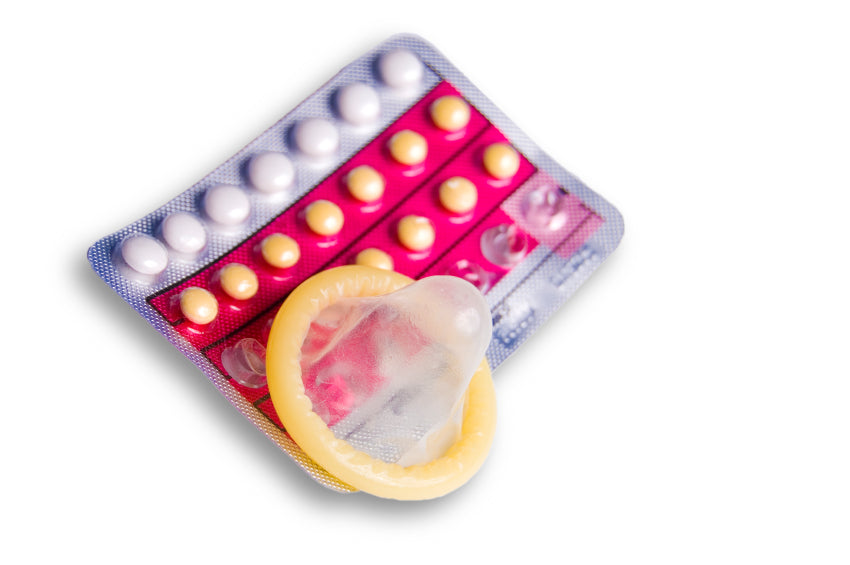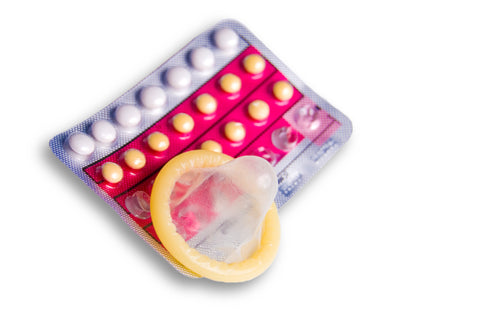
Getting Pregnant After Stopping Birth Control - How To Increase Your Odds

You and your partner have happily lived the life of “just you” for a while and have recently had the “talk.” Adding to your family is very appealing, and you want to start trying to get pregnant. It can be exciting and nerve-wracking stopping birth control and start “trying.”
The amount of time it takes for you to get pregnant after you stop birth control depends on what type of birth control method you were using. Once you stop using non-hormonal birth control, you have the same chances of getting pregnant as non-birth control using women.
Healthy women under 30 have about a 20% chance of getting pregnant each month.
Covered in This Article:
- Stopping Non-Hormonal Birth Control
- Stopping Hormonal Birth Control
- Reversing "Permanent" Birth Control and Getting Pregnant
- Increasing Your Chances of Getting Pregnant After Stopping Birth Control
- My Hormone Balance and Ovulation is Back to Normal! Now What?
- How Long Will It Take For Me To Get Pregnant?
Stopping Non-Hormonal Birth Control
NPF - If you are using the rhythm method, also known as Natural Family Planning (NFP), to avoid getting pregnant, when you stop, you will be fertile right away.
NFP tracks when you ovulate, and then you avoid having sex during your fertile time. Once you decide to try to conceive, you can use your knowledge of your cycles have sex when you are the most fertile and most likely to get pregnant.
Barrier Methods - If you have been using a barrier method (condom or spermicide) to prevent unplanned pregnancy, you can get pregnant as soon as you don't use them. These methods do not have any long-term impact on your fertility.
IUD - If you were using a copper IUD, you should be able to get pregnant once you have it removed.
Stopping Hormonal Birth Control
If you were using a form of hormonal birth control, it might take you a bit longer to get pregnant once you stop using it. Most hormonal birth control stops ovulation to prevent pregnancy. It will take your body a bit of time to hormonally regulate itself after finishing. Once your hormones are stable again, you will start ovulating, and you will be able to conceive.
The Pill - You might need to wait a couple of months before you can get pregnant after stopping your birth control pills. Your body has to regain the hormone balance required for a successful pregnancy. Getting pregnant the month you stop your pills is possible, but most women find it takes a couple of months for your body to start ovulating again. It depends on how your body reacts to the hormonal changes.
Hormone IUD - After you get your hormone-based IUD removed from the uterus, your cycle will likely return to normal within 3 to 6 cycles.
Birth Control Shot - Depo Provera - Depo Provera is a progestin shot that is injected into a woman's body every three months. This method is a highly effective form of birth control. Once you stop getting the shots, you might be able to conceive within six months.
On average, it takes anywhere between 3 – 9 months, AFTER your shot wears off, most women may conceive.
Birth Control Implant - Norplant - After you get your implant removed, it might take a couple of months to reach hormone balance. Once you are ovulating again, your periods will be regular, and you will be able to get pregnant.
Reversing “Permanent” Birth Control and Getting Pregnant
What if I tied my tubes? Can I get pregnant if I get the procedure reversed?
This is the most difficult procedure to reverse when it comes to trying to conceive. Sixty percent of women can have successful pregnancies after having their tubes "untied."
Unfortunately, the chances of painful ectopic pregnancies increase after the procedure. To reverse this procedure, major surgery is a must, and there is always a chance that the tubes have been damaged due to scarring.
If scarring is present, you may have a difficult time getting pregnant, if you can at all.
My husband had a vasectomy – is it reversible?
The success rate of reversing vasectomies is around 40%. The success rate is much lower when compared to the success rate of a tubal ligation reversal.
Increasing Your Chances of Getting Pregnant After Stopping Birth Control
For women who used hormonal birth control, regaining hormonal balance is the absolute first thing that needs to happen. You need to be ovulating if you are going to get pregnant.
The hormonal birth control is useful because it makes sure that doesn't happen. Depending on which method you used, it could take three months or much longer for you to start ovulating regularly again.
For hormonal birth control users, your body will regain its hormonal balance naturally on its time frame. Many women are not happy with the wait time and take steps to help their body out.
To help encourage your fertile hormone balance, a fertility cleanse might be helpful. A fertility cleanse helps support the liver in clearing out the synthetic hormones. Once that occurs, your fertility friendly hormones come back into balance.
Both FertileDetox and Pre-Conception Fertility Tea provide a gentle fertility cleanse. A fertility cleanse is helpful for everyone who is trying to conceive not just those who have been using hormonal birth control. Our bodies are always at odds with our chemical-laden environment. The air we breathe, and the food we eat can tax our body's ability to keep a fertile balance.
Vitex is another supplement that you might want to consider. Vitex helps your body regain regular ovulation every month. You need to take Vitex regularly to get the full fertility boosting benefits. It's available in a single herb organic capsule and a combination supplement that also includes a prenatal vitamin.
My Hormonal Balance and Ovulation are Back to Normal! Now What?
The majority of women will get pregnant, eventually. Once you are ovulating regularly, you need to make sure you are having sex at the right time. There are only about six days during the month when you are fertile and can get pregnant. You can use our ovulation calculator to find out when you are most fertile. Having sex at the right time dramatically increases your chances of getting pregnant.
How Long Will It Take For Me To Get Pregnant?
How long it takes to get pregnant after stopping birth control will vary from woman to woman. It will depend on your overall health, lifestyle choices, having sex at the right time, and how old you are.
It doesn't seem fair that you are "punished" for wanting a career and life before kids, but studies show that the longer you wait, the longer it will take for you to get pregnant. After you hit 30, your odds start going down.
Age Breakdown of Chances of Getting Pregnant
Under 25 years: 96% in 1 year *
25 - 30 years: 86% in 1 year
30 years: 75% in 1 year, 91% within 4 years *
35 years: 66% in 1 year, 84% within 4 years
40 years: 44% in 1 year, 64% within 4 years
As you age, your body starts gearing up to shut down the baby making factory. There will be occasional months where no ovulation occurs. Without an egg being released, there is no chance of pregnancy.
Additionally, different aspects of your reproductive system start to decline:
- Egg quality and quantity starts to decrease.
- Your menstrual cycle may shift due to age-related hormonal changes.
- The uterine lining can become thinner and make sustaining a pregnancy harder.
All's not lost though. Although it may be true that your fertility declines as you age, some supplements can address some of the issues that accompany trying to conceive in your 30's and 40's.
While you can't increase the number of eggs you have, you can improve the quality of the ones you have left. Ovaboost helps strengthen your eggs and reverse some of the damage that free radicals cause over the years.
To improve the thickness of your uterine lining, supplements that contain arginine are helpful. A thicker uterine lining gives a fertilized egg a supportive, caring place to implant and grow.
The arginine also improves the quality of your cervical mucus. Fertile cervical mucus protects the sperm and helps it move more easily towards the waiting egg. Additionally, arginine can help boost your sex drive. Trying to conceive month after month can really dry up your desire, so an added boost to this department is welcome.
When you stop taking birth control, it can take a bit longer for you to get pregnant. There are things you can do to help you get there faster. Patience and timing will get you there in the end! Good luck!
References:
Kent A. Pregnancy Rates After Oral Contraceptive Use. Reviews in Obstetrics and Gynecology. 2009;2(4):246. https://www.ncbi.nlm.nih.gov/pmc/articles/PMC2812881/
Barnhart KT, Schreiber CA. Return to fertility following discontinuation of oral contraceptives. Fertil Steril. 2009 Mar;91(3):659-63. doi: 10.1016/j.fertnstert.2009.01.003. Review. PubMed PMID: 19268187.
Glasier A. Implantable contraceptives for women: effectiveness, discontinuation rates, return of fertility, and outcome of pregnancies. Contraception. 2002 Jan;65(1):29-37. Review. PubMed PMID: 11861053.
Fitzgerald CT, Seif MW, Killick SR, Elstein M. Age related changes in the female reproductive cycle. Br J Obstet Gynaecol. 1994 Mar;101(3):229-33. Erratum in: Br J Obstet Gynaecol 1994 Apr;101(4):360. PubMed PMID: 8193098.
Tags:
Getting Pregnant
Quick links
Search
Contact Us
Shipping Information
Helpful Info
Terms of Service
Privacy Policy
Do not sell my personal information
Contact us
About us
BabyHopes.com is a family owned and operated business, opened in January 2001. We have been serving the trying to conceive community for over 20 years.

Leave a comment: